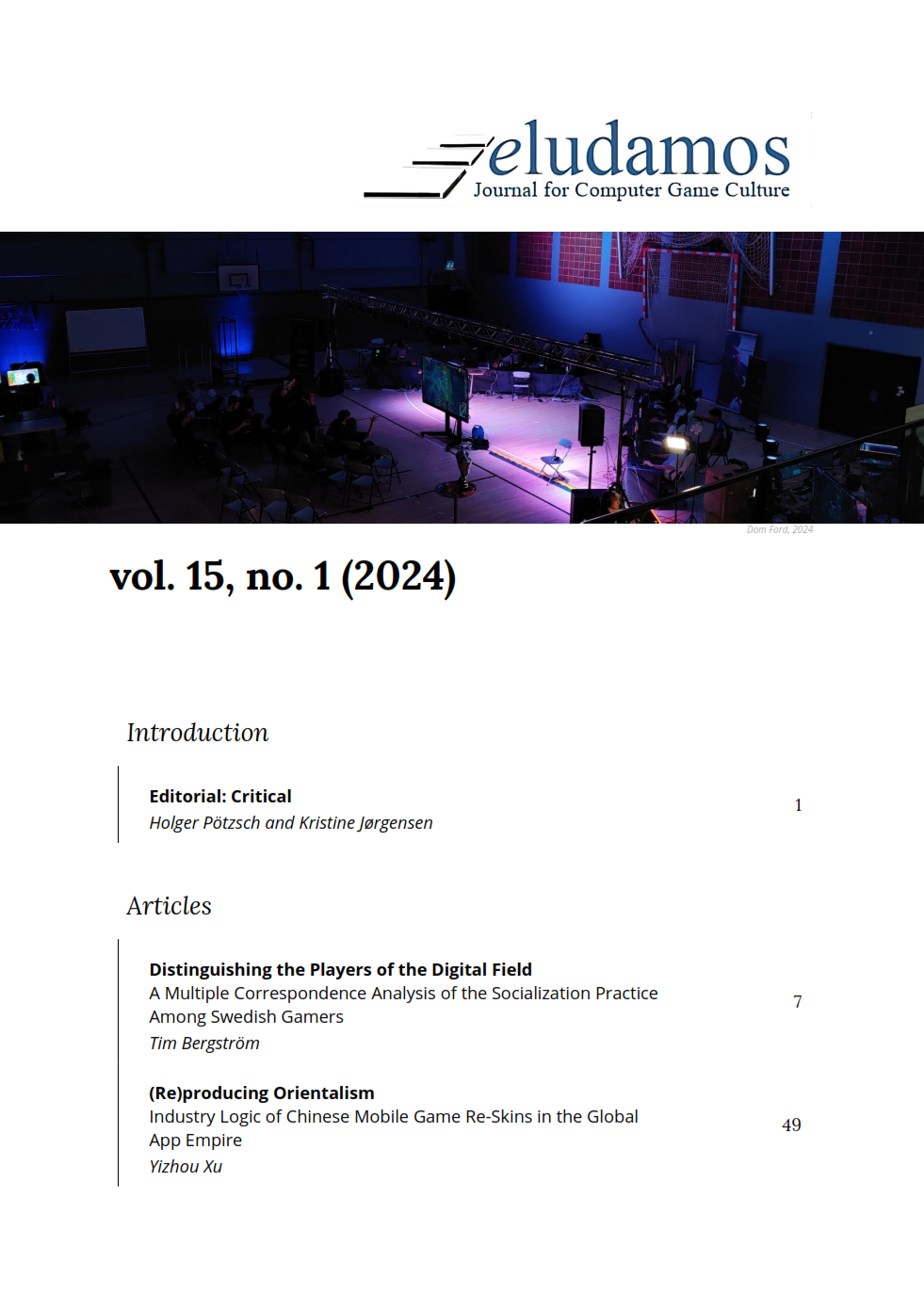Equitable forms of participation on a gaming-adjacent platform
The platformization of a youth center
DOI:
https://doi.org/10.7557/23.7744Keywords:
Discord, ethnography, platformization, moderation, infrastructureAbstract
To connect with youth online, a non-profit organization in Finland is organizing a youth center on a server on the gaming-adjacent social platform, Discord. We focus on the infrastructuralized platform and study ethnographically how the labor of moderation and technical competencies that platforms require on the part of the youth workers. We want to better understand the technical conditions by which youth workers have to navigate equity in platformized communities. How does the platform and connected infrastructure determine what forms of communication and interaction are and are not permitted and when and to whom? The results indicate that the employment of opening hours and the presence of youth workers who actively moderate the server during those opening hours, seem to create a safe space for a diversity of youth. The moderation, largely invisible and frictionless, becomes an intricate part of the infrastructuralized platform and the socialization on the platform. This infrastructuralized moderation requires technical, pedagogical and psychological knowledge, competence and resources.
Publication Facts
Reviewer profiles N/A
Author statements
Indexed in
-
—
- Academic society
- N/A
- Publisher
- Septentrio Academic Publishing
References
Brown, A. (2015). Awkward: The importance of reflexivity in using ethnographic methods. In P. Lankoski, & S. Björk (Eds.), Game research methods (pp. 77–92). ETC Press.
Caetano, M. A., & Blanco, B. (2022). They will do anything to make you react: Deplatforming racists from the Brazilian gaming community. gamevironments 17, 58–98. https://doi.org/10.48783/gameviron.v17i17.198
Danjou, P. E. (2020). Distance teaching of organic chemistry tutorials during the COVID-19 pandemic: Focus on the use of videos and social media. Journal of Chemical Education, 97(9), 3168–3171. https://doi.org/10.1021/acs.jchemed.0c00485 https://doi.org/10.1021/acs.jchemed.0c00485
Gillespie, T. (2010). The politics of ‘platforms’. New Media & Society, 12(3), 347–364. https://doi.org/10.1177/1461444809342738 https://doi.org/10.1177/1461444809342738
Gillespie, T. (2019). Custodians of the internet: Platforms, content moderation, and the hidden decisions that shape social media. Yale University Press. https://doi.org/10.12987/9780300235029
Jiang, J. A., Kiene, C., Middler, S., Brubaker, J. R., & Fiesler, C. (2019). Moderation challenges in voice-based online communities on Discord. Proceedings of the ACM on Human-Computer Interaction, 3(CSCW), 1–23. https://doi.org/10.1145/3359157 https://doi.org/10.1145/3359157
Johnson, E. K., & Salter, A. (2022). Embracing discord? The rhetorical consequences of gaming platforms as classrooms. Computers and Composition, 65. https://doi.org/10.1016/j.compcom.2022.102729 https://doi.org/10.1016/j.compcom.2022.102729
Kerr, A., & Kelleher, J. D. (2015). The recruitment of passion and community in the service of capital: Community managers in the digital games industry. Critical Studies in Media Communication, 32(3), 177–192. https://doi.org/10.1080/15295036.2015.1045005 https://doi.org/10.1080/15295036.2015.1045005
Larkin, B. (2013). The politics and poetics of infrastructure. Annual Review of Anthropology, 42(1), 327–343. https://doi.org/10.1146/annurev-anthro-092412-155522 https://doi.org/10.1146/annurev-anthro-092412-155522
Møller, K., & Robards, B. (2019). Walking through, going along and scrolling back: Ephemeral mobilities in digital ethnography. Nordicom Review, 40(S1), 95–109. https://doi.org/10.2478/nor-2019-0016 https://doi.org/10.2478/nor-2019-0016
Nelson, E., Perry, M.,and Rogers, T. (2020). Introducing offlineness: Theorizing (digital) literacy engagements. Journal of Literacy Research, 52(1), 101−107. https://doi.org/10.1177/1086296X19898003 https://doi.org/10.1177/1086296X19898003
Nieborg, D. B., & Poell, T. (2018). The platformization of cultural production: Theorizing the contingent cultural commodity. New Media & Society, 20(11), 4275–4292. https://doi.org/10.1177/1461444818769694 https://doi.org/10.1177/1461444818769694
Plantin, J.-C., Lagoze, C., Edwards, P. N., & Sandvig, C. (2018). Infrastructure studies meet platform studies in the age of Google and Facebook. New Media & Society, 20(1), 293–310. https://doi.org/10.1177/1461444816661553 https://doi.org/10.1177/1461444816661553
Rusk, F., & Ståhl, M. (2024). Esports: The new “white boys” club? Problematizing the norms limiting diversity and inclusion in an educational gaming context. In V. Tavares, & T.-A. Skrefsrud (Eds.), Critical and Creative Engagements with Diversity in Nordic Education (pp. 213–230). Lexington Books.
Srnicek, N. (2017). Platform capitalism. John Wiley & Sons.
Star, S. L. (1999). The ethnography of infrastructure. American Behavioral Scientist, 43(3), 377–391. https://doi.org/10.1177/00027649921955326 https://doi.org/10.1177/00027649921955326
Ståhl, M., & Rusk, F. (2022). Maintaining participant integrity: Ethics and fieldwork in online video games. In L. Russell, R. Barley, & J. Tummons (Eds.), Ethics, ethnography and education (pp. 87–107). Emerald Publishing. https://doi.org/10.1108/S1529-210X20220000019006
Taylor, N., & Voorhees, G. (2018). Introduction: Masculinity and gaming: Mediated Masculinities at play. In N. Taylor & G, Voorhees (Eds.), Masculinities at play (pp. 1–19). Springer Nature. https://doi.org/10.1007/978-3-319-90581-5_1
Taylor, T. L., Boellstorff, T., Nardi, B., & Pearce, C. (2013). Ethnography and virtual worlds: A handbook of method. Princeton University Press. https://doi.org/10.1515/9781400845286
Wiles, A. M., & Simmons, S. L. (2022). Establishment of an engaged and active learning. community in the biology classroom and lab with Discord. Journal of Microbiology & Biology Education, 23(1). https://doi.org/10.1128/jmbe.00334-21 https://doi.org/10.1128/jmbe.00334-21
Witkowski, E. (2018). Doing/undoing gender with the girl gamer in high-performance play. In K. L. Gray, G. Voorhees, & E. Vossen (Eds.), Feminism in play (pp. 185–203). Springer Nature. https://doi.org/10.1007/978-3-319-90539-6_11
Downloads
Published
How to Cite
Issue
Section
License
Copyright (c) 2024 Fredrik Rusk, Matilda Ståhl, Isac Nyman

This work is licensed under a Creative Commons Attribution 4.0 International License.








